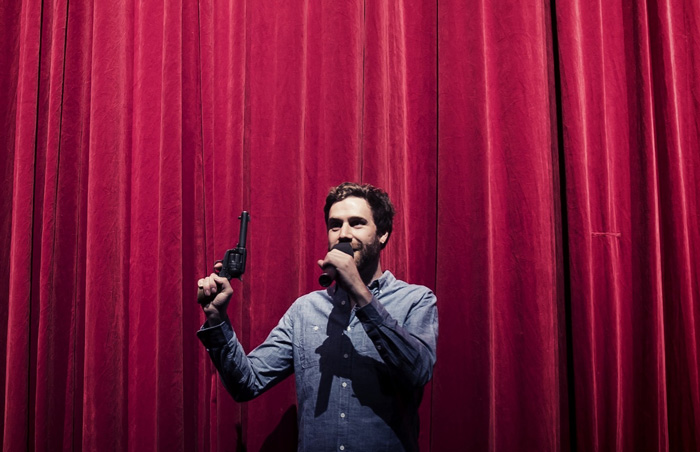
Dead Centre, a Dublin-based theatre company founded by Bush Moukarzel and Ben Kidd, aims to deconstruct and rearrange theatre and its components. Just last year, Moukarzel directed Lippy, which won an OBIE award for its mind-bending use of multimedia and spoken language. Lippy was touted as a fantastic, almost Brechtian look at the processes of theatre practice. It comes as no surprise then that Dead Centre’s latest venture, Chekhov’s First Play, is another feast for the senses as Moukarzel leads us through Chekhov’s story, speaking directly to each individual using an innovative series of headphones.
The story of Chekhov’s first play, entitled Platonov, was simple – six friends waiting for another to arrive. Their interactions with one another and their surroundings make it seem more like an exercise in observation. However, Kidd and Moukarzel turn a drab script into an immersive roller coaster. From the outset, Moukarzel narrates to the audience his thoughts, descriptions, and lamentations about the play and its players. This directorial insight into the production demonstrates the difficulties involved in adapting a play, choosing what’s good enough to stay and cutting what isn’t fit to go on. The spectators observing the action view a small slice of the past while being granted the views of a modern human trying to create art and a profit from an essentially dismissed script.
Dead Centre’s latest venture, Chekhov’s First Play, is another feast for the senses
However, Moukarzel and Kidd move the piece away from its depiction of late nineteenth-century life, shooting it forward in time through the use of light transitions and frankly remarkable kinetic set changes. Rather than the uptight and stuffy party scene from aeons ago, we now see a modern party. This time travel divides the play into two very distinct styles, the latter being more familiar to those well read in Dead Centre productions. Although the actors go almost completely off the original script, they now speak with a vicious intensity, masked by a modern air of apathy and “cool.”
The piece becomes a suicide note to those past playwrights who strove to depict larger-than-life characters. Instead, it presents to us the true nature of those individuals. It’s not all doom and gloom though; there’s a tightly knit mixture of drama and comedy, providing much needed relief. In the first half, the comedy maintains a early-twentieth-century style, relying on hidden sex jokes and humorous directorial insights.
Dead Centre has produced a piece that is pushing Irish theatre back into the limelight
The breakdown of the stage indicates a change in characters towards their modern counterparts, allowing a more modern sense of humour by referencing the absurdity of modern drama and our country as a whole.
Dead Centre has produced a piece that is pushing Irish theatre back into the limelight. They’ve utilised every resource at hand in order to pull the audience into the action, and make them reel in horror.






